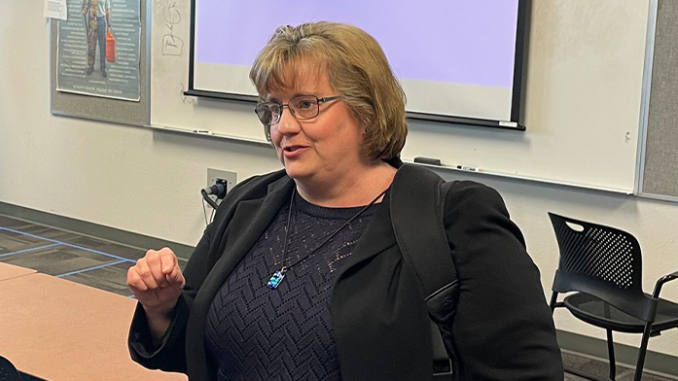
As Maricopa County officials plan to spend more than $8 million to replace hundreds of ballot printers, the company whose printers were involved in complaints during in-person voting last November is pushing back on the county’s suggestion that equipment failure was to blame.
Instead, Japan-based OKI contends county elections staff appear to have not used the company’s B432 general duty printers within specifications. The company also claims it was never asked to be part of a $90,000 post-election investigation initiated by Maricopa County Attorney Rachel Mitchell.
About 17,000 voters experienced problems on Nov. 8 at various county voting centers when tabulators at those locations could not “read” their ballots. It was later determined the fuser or heating element on several OKI B432 ballot on demand printers did not get the 20-inch, 100-pound paper hot enough for the toner (or ink) to securely attach to the double-sided ballot.
Those ballots had to be transported to Maricopa County’s central elections center after the polls closed to be run through different tabulators. Later, Mitchell arranged for former Arizona Supreme Court Justice Ruth McGregor to conduct the independent investigation of the printer problems.
McGregor’s report, issued in April, supported an internal county finding that dozens of the B432 printers had problems with toner flaking off impacted ballots. The report also noted heavy duty ballot on demand printers manufactured by Lexmark used in some voting centers did not have similar problems.
McGregor’s report noted Maricopa County’s election process pushed the OKI printers “to perform at the very edge of or past their capability.” This left the impression that OKI equipment and not any human fault was to blame for the difficulties voters faced on Election Day.
OKI has pushed back, issuing a statement last month rebutting three key “factual errors” in McGregor’s report. The company has also asked the county attorney to issue a corrected report although no update has been released as of press time.
OKI’s statement starts by taking a swipe at McGregor’s team for not involving the company in the investigation.
“OKI was not contacted by Maricopa County officials, investigation teams working on their behalf, election services providers, or any other parties associated with the investigation at any time during the investigation,” the statement reads. “We believe that all of these inaccuracies would have been avoided had the investigatory team simply contacted OKI in advance of the report’s release.”
The three factual errors included in OKI’s statement are pretty significant, including the incorrect assertion by McGregor’s team that the fuser of an Oki B432 printer “cannot be” separately replaced.
“The fuser for the B432 is in fact available for replacement and can be changed onsite by a printer technician,” the company responded.
McGregor’s team also allegedly got its information wrong when claiming OKI – which has discontinued selling that printer in North America – will not provide parts and supplies for its B432 after Dec. 31, 2025.
“In the specific case of the B432 model, OKI will continue to supply consumables and spare parts for this model through at least March 31, 2028,” the company stated.
But the company’s biggest beef involves a statement in McGregor’s report that claims OKI provided “assurances” that the B432 could print 20-inch ballots on 100-pound paper through the paper cassette under Election Day conditions.
According to the company, no such assurance was ever made. In fact, the statement notes the maximum paper weight utilizing the paper cassette is 80 pound.
The “true underlying cause of the election issues” seems to have been Maricopa County’s use of 100-pound paper “without reviewing the manual and/or confirming with OKI that such use was within the specifications of the OKI B432 printers,” the statement reads.
Public records show Maricopa County used 100-pound ballot paper in 2022 instead of the 80-pound paper its ballots were printed on in 2020. And after the 2022 primary election in August, the length of Maricopa County’s ballots went from 19 inches to 20 inches.
Other records show county officials tested a 19-inch ballot using 100-pound paper in April 2022. There was also testing of a 20-inch ballot, but it used 80-pound paper.
Maricopa County has approved spending more than $8 million to amend its current contract with Runbeck Election Services for the replacement of hundreds of $300 over-the-counter style OKI printers with 550 Lexmark printers which reportedly cost $7,000 each. There is additional costs for various software, service support, and toner, all of which is being done on no-bid basis. .
It is unclear if the county is getting any type of trade-in credit for the Oki printers.
The problems experienced last year by Maricopa County voters has raised questions about whether Arizona should have standardized tests for the ballot on demand printers. And even whether the state certification process for electronic voting and machine tabulation should be expanded to include those printers.
For now, Maricopa County elections officials have announced plans to work with Runbeck to put the Lexmark printers through a more rigorous testing regime, one that better duplicates the ebb and flow demands of Election Day as well as the proper paper weight and size.
READ MORE ABOUT MCGREGOR’S REVIEW:
Over Billing And Lack Of Openness Mar Ballot Printer Investigation
